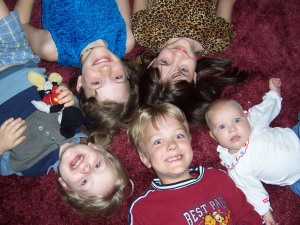
Can Children Be Happy? By M. C.
In the Nicomachean Ethics, Aristotle, the Greek philosopher, states in the opening chapter that happiness is the highest goal of all human deliberate actions. He takes this as a starting point, going on to describe what is essential to happiness. He saw happiness as the “virtuous activity of the soul in accordance with reason”. Since the quality of a person’s habits determine in large part their character, good habits, or virtues, are necessary to happiness, as is intelligence so that one may guide one’s action within the boundaries of reason. Aristotle concluded that children are incapable of happiness inasmuch as they have not developed the ability to use their intelligence to guide their actions. Thus, children cannot be happy.
Many people confuse happiness with pleasure or joy. Joy is the emotion evoked by well-being, success, or good fortune or by the prospect of possessing what one desires. Joy is not lasting and is dependent on one’s fortune. Pleasure can be found in amusement, diversion, or worldly enjoyment. It is a temporary cause for delight. Pleasure can be taken from something as small as a piece of candy. Pleasure is in small, temporary joy. Everyone has feelings of pleasure. This is what a child experiences – not happiness. Happiness is something different. Happiness is lasting joy which comes from the practice of virtue in accordance with reason, which is the highest good of the soul.
People are not born with virtue already acquired; in fact one might say that they are born not with virtue but with faults. Children do not have control over their wills. They follow their desires because their intelligences have not yet formed adequately, and they do not see why it is, for example, that their parents forbid them to have too much ice cream. They cannot see the reasoning behind it. And consequently they are unhappy when they are refused the ice cream. A child must have pleasure or he or she is unhappy. One might object to this saying that even children who are deprived of natural pleasures, such as good food and nice clothes, are not miserable, and therefore children must be able to be happy. However, children are able to find entertainment and delight in almost anything because of their simplicity and large imaginations; and thus one could not say they were happy, but merely finding pleasure in smaller things.
Also, children are not happy because they do not know how to love. A child may experience gratitude or attachment towards a certain person, but only because that person gives them good things such as toys or candy. But children do not appreciate the love their parents have for them. They only appreciate the things that their parents give them that cause delight, and they hardly ever appreciate it when their parents punish them even though it is actually doing them good.
Another reason that we cannot say that a child is happy is because their life is not yet completed. Just as when one is reading a book, one cannot say at the beginning that it is a good book because one has not yet read the middle or end. All one can say is that the book begins well. Aristotle states that, “For there is required, as we said, not only complete virtue but also a complete life, since many changes occur in life, and all manner of chances, and the most prosperous may fall into great misfortunes in old age, as is told of Priam in the Trojan Cycle; and one who has experienced such chances and has ended wretchedly no one calls happy.” Napoleon Bonaparte is another example. From a mere artillery officer he rose to become the emperor of France, but was finally conquered and spent the last six years of his life under British supervision on the island of Saint Helena. Thus, children are called happy not because they are happy at the time, because we have high hopes that they will be happy. As Aristotle says, “A boy is not happy owing to his age; boys who are called happy are being congratulated by reason of the hopes we have for them.”
Thus, to be happy, a person must have a complete life and complete virtue. This is what Aristotle means by “the second act”. The first act is potentiality for the second act. The second act is actuality. That is why children cannot be happy. But then, must no one be called happy while they are alive? For until a person is dead no one can know if that person had a good, virtuous life or no. However, as Aristotle points out, “”Certainly the future is obscure to us, while happiness, we claim, is an end and something in every way final…If so, we shall call happy those among living men in whom these conditions are, and are to be fulfilled.”
Thus, children cannot experience happiness, but only pleasure because they do not have sufficient control over their intellects and wills. However, not being able to be happy does not make children miserable. God has given children the gifts of simplicity and great imagination which allows them to find many pleasures. Good educators must strive to teach children virtuous habits by good example, so that they may grow in that direction. Good educators must also attempt to improve children’s minds so that their virtuous actions may be guided by good reasoning so that their pupils may progress far along the path towards happiness: the goal of all human actions. Of course, the reason why all of this is so important is because it determines where we go after death. All virtuous men go to heaven in the afterlife, while the men who scorned virtue do not. Perfect happiness can only be achieved in heaven.





Apr 30, 2012 @ 17:37:09
Very nicely written! I am using this as an example for my essay with the sam topic.